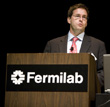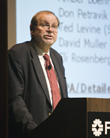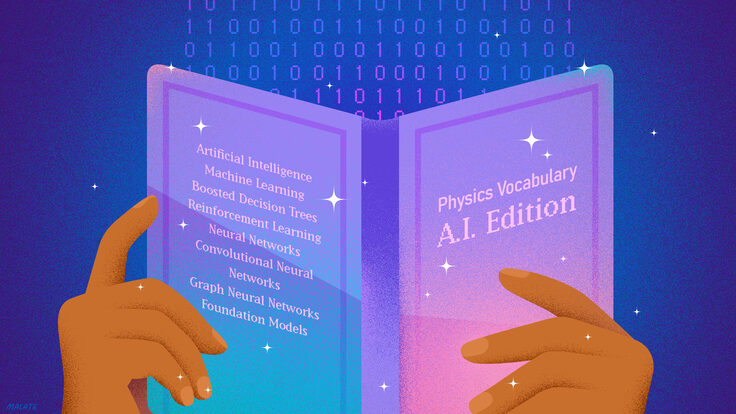The particle physics community is moving in the right direction to keep the field vital, but needs to increase the momentum amidst difficult budget times.
A series of talks Wednesday by Washington policy makers at the annual Users' Meeting focused on how Congress and funding agencies view particle physics and what those groups want to hear from the field in the future.
 |
| Michael Holland, examiner for the Office of Science projects for the Office of Management and Budget. |
The particle physics community has made great strides in presenting scientific opportunities on the energy, intensity, and cosmic frontiers and focusing on the excitement of discoveries on the horizon, said Michael Holland, examiner for the Office of Science projects for the Office of Management and Budget.
He called for the community to continue to engage further the public imagination in its research projects while also producing statistics for policy makers that show the broader benefits to the nation. Holland asked for more data on particle physics as a net exporter of talent and a pathway to national innovation.
The High Energy Physics Advisory Panel has undertaken a study of how many of those receiving degrees in particle physics go on to work in government and private industry, including the fields of computing, medicine, and finance.
"That will be essential for keeping you in the game," Holland said. "People may be your most important product."
 |
| Dr. Dennis Kovar, acting associate director for High Energy Physics at DOE's Office of Science. |
The work of the particle physics community to develop a "realistic, robust" P5 roadmap recently approved by HEPAP also strengthens the case for particle physics funding, said Dr. Dennis Kovar, acting associate director for High Energy Physics at DOE's Office of Science.
The report sets the stage for the United States to become a world leader at the intensity frontier, building on Fermilab infrastructure, and to make exciting discoveries at the energy and cosmic frontiers, "There really is an exciting future," he added. "The question is how do you get from here to there in terms of resources and making a case."
The large number of particle physics connections with universities in dozens of states creates a great political asset for the field, said Adam Rosenberg, a Congressional staffer for the House Committee on Science and Technology. He stressed strengthening ties with other scientific fields as well.
The FY2009 budget scenario will require combined efforts because it is shaping up to be "eerily similar" to the FY2008 budget and could lead to a holding pattern in funding until the arrival of a new administration.
A continuing resolution likely would prolong the severe budget challenges for particle physics, Kovar said.
"We will do our best to ensure a world-class, strong program with the resources available," he added.
See all reports from the Fermilab Users’ Meeting 2008 here.






